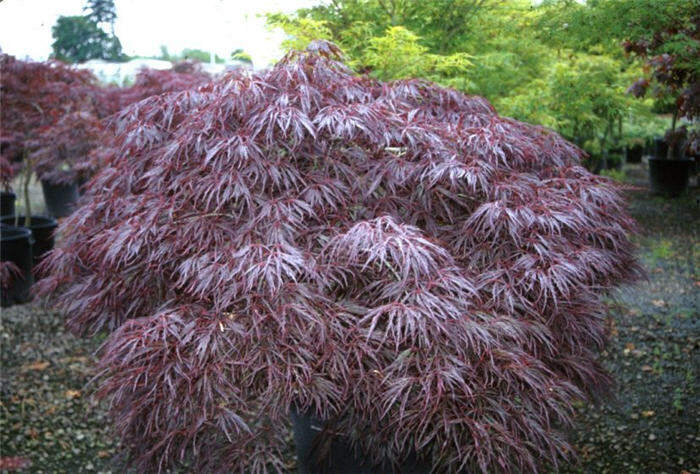| Botanical Name: Acer palmatum 'Dissectum Tamukeyama' | |
| Common Name: Tamukeyama Laceleaf Japanese Maple |

-
Anatomy
-
Culture
-
Design
Plant Type
Tree
Height Range
3-6'
Flower Color
n/a
Flower Season
n/a
Leaf Color
Purple, Red
Bark Color
Brown, Green
Fruit Color
n/a
Fruit Season
n/a
Sun
Half, Shade
Water
High, Extra in Summer
Growth Rate
Slow
Soil Type
Clay, Loam
Soil Condition
Average, Rich, Well-drained
Soil pH
Acid, Neutral
Adverse Factors
n/a
Design Styles
Formal, Japanese, Meadow, Water Garden, Woodland
Accenting Features
Specimen, Unusual Foliage
Seasonal Interest
Winter, Spring, Summer, Fall
Location Uses
Entry, Shrub Border, Foundation, Raised Planter
Special Uses
Small Spaces
Attracts Wildlife
n/a
Information by: Stephanie Duer
Photographer: Don Syrek
Photographer: Don Syrek
-
Description
-
Notes
Tamukeyama has excellent weeping form with new growth shoots cascading down to 24 inches long. New foliage is a deep crimson red, turning to a deep purple as it matures. The word TAMUKEYAMA means “TRIBUTE TO THE MOUNTAINâ€. Grows 4 to 6 feet tall and 6 to 10 feet wide, though it will do so slowly.
As will all Japanese Maples, provide deep, rich, well composted soil. If you are amending the soil, it is best to dig in compost to the plant's eventual width, so as to provide adequate conditions for the entire, eventual root profile. Amending just the hole that the tree is planted in is akin to planting the tree in a slightly bigger pot. Plant in filtered light to full shade, avoiding any mid-day sun or reflective sun. East or north exposures are best unless thre is a very good canopy and no reflective heat. Water weekly. Do not shear.